Leon performing heart surgery.
On this blog I have taken the time to expound on the human body as seen and understood throughout the ages, mainly because I am in pursuit of accepting the aging process with a different set of eyes—a different perspective. I’ve already posted a poem written by my grandmother about aging, and today I’m posting a poem written by my father, Leon Levinsky, not so much about aging but very much about an aspect of it that I have not made my main focus. Heart disease is a problem that many experience at a certain stage of their life; there are so many ways to prevent heart disease from happening in the first place, and yet there is so much ignorance revolving around this important health topic.
Usually, when we hear about surgery, it’s solely about the patient’s experience; what makes this poem so unique is that rarely do we get a glimpse of what goes on through the surgeon’s mind as they engage in this life-threatening procedure. Leon’s poetry shows that there is more to him than meets the eye—usually very shy and mostly reserved—this poem gives you a rare glimpse at a man who is very much an artist as well as a serious surgeon. He demonstrates a knack for being able to draw you into his world by navigating through a complicated procedure, yet artfully shuttling back and forth between technical jargon and grisly details that allow you to live through his experience of bringing a heart back to life.
This has given me a renewed appreciation for what he does. However, I have to say that I still scratch my head when thinking of all the times I would see him handing my mother one of his socks for mending; I mean, the guy knows how to sew up a heart, and yet he could never fix a hole in his own sock!
As a heart surgeon’s daughter, I grew up privy to detailed conversation around the dinner table, watching the way my father would react in emergency situations—hardly having him home for that matter—I am proud to say that Leon Levinsky represents a special breed of surgeons. I remember the odd neighbor that would stand outside our door, waiting for my father to arrive home from work—my father tired, exhausted—yet, still sensitive enough to listen to anyone’s medical problems and resolve their issues. I’ll never forget the day that an old Russian woman (I think she was Russian, but not sure), knocked on our front door holding a large box filled with oranges in one arm, and in the other, grasping the hand of her young grandchild. Leon had operated on her husband and saved his life, and she insisted on expressing her gratitude by traveling from her home, having ridden a few buses, and trekking up the hill where we lived, in order to come bearing oranges for my father. As I peeked through the kitchen door, I could see the woman’s gold teeth glimmering through a bashful smile. My father would immediately make anyone in his presence feel comfortable, so the nerves soon melted away. As she sipped from her cold drink and nibbled on a few biscuits, Leon learned about each one of her family members.
There were some unpleasant memories as well, like a family who had threatened to kill Leon because their father had died on the operating table; it was not my father’s fault, but nevertheless, he found himself having to hide from them out of fear for his life. When there was a knock on the door one evening, and we opened it, forgetting about Leon’s warning—it happened to be one of our friends—but regardless, he yelled at us for almost getting him killed. Usually, when a heart operation is successful, people tend to thank God but when things go wrong it’s the surgeon’s fault. A few years ago when I gave birth to my son Jack, the anesthetist in the operating room yelled at me for shaking too much before I was given an epidural. I was completely shocked by his mood and temper. Then, while lying down awaiting the surgeon to begin the C-section the anesthetist yelled at one of the nurses for not introducing herself to him in “his” operating room. The poor nurse looked just as shocked and terrified as I was. My IV popped out of my vein mid-surgery and I’ll never forget how brutal he was in pricking the back of my hand over and over again to get it back in, at which point I began to throw up and he looked completely infuriated with me. My son’s birth will always be tainted by that doctor’s terrible bedside manner, but fortunately I have some good experiences as well with nice doctors. And most important, I have wonderful memories of my father’s patients whom I’ve met occasionally over the years—giving their praise of how sensitive and caring Leon had been during their time of need. Now it’s time to learn about how surgeons develop wrinkles.
“A Heart Operation”
A scalpel slices skin
In the midline
A saw divides the sternum
With a sickening sound
Bleeding is stopped
A retractor is wound open
There is a hubbub
In the operating room
Christie is harvesting a vein
From the leg
While I preside
At the chest
Like the captain
Of a ship
Like a captain of a ship.
Joe administers anesthesia
So the patient is unconscious
And will not be aware
When his heart has stopped
Sylvia hands over instruments
Never has to be asked
Always the right one
So reassuring for me
Sylvia in perfect sync with Leon.
Linda sits at the pump
A giant machine
Of tubes and cylinders
Instead of the beautifully designed
Heart and lungs
Amy is circulating
Darting around the room
Music in the background
Pagers are beeping
Phones are ringing
Gossip is exchanged
But there is a person
Beneath the drapes
For whom this
Is no routine day
It is the second most
Important day of his life
The first was his birth
Concentrating on the task.
I am oblivious
To the surroundings
As I concentrate
On my task
To fix this heart
And bring it back to life
There is a puff of smoke
As I use the bovie
To open the pericardium
And expose the heart
In all its sick glory
Covered in a layer of yellow fat
With red arteries and blue veins
Barely discernible in the depths
The heart covered in a layer of yellow fat.
From the front the damage
Is not so evident
But then I lift the heart
And my own heart
Misses a beat
As I realize
That this one
Is too heavy
Too thick and sluggish
With a pale patch
At the back
Testament to muscle
No longer alive
I inspect the arteries
I inspect the arteries.
That need to be bypassed
I have made my plan
Purse string sutures are placed
On the aorta and atrium
A knife jabs a hole
Blood spurts and
Cannulas are inserted
And connected to
The heart lung machine
Now Linda is alert
As I tell her
“Start the pump”
Purple blood exits the heart
On its way to the machine
And is miraculously transformed
Into red blood
To be pumped
Back to the aorta
And so to the brain and other organs
“Start cardioplegia” and now
The heart slows and stops
Under the influence of potassium
Ice slush is poured on the heart
To lower the temperature
Fifteen degrees that’s good
Three pairs of hands.
There are now three pairs of gloved hands
Over that small space
One pair holds the heart
Now lifeless
Like a slab of meat
While I use a knife
To make an opening
In an artery,
One or two millimeters
Another pair of gloved hands
Assists me as I join
The end of a vein
To the opening
Using a sewing technique
I learned in this very hospital
Over thirty years ago
From my teacher, George Schimert
Who said to me
“Leon, handle the heart
As you would a woman’s breasts
With gentleness love and respect”
Handling the heart as you would a woman’s breasts.
And reflect on the Man beneath the drapes
Essentially he has no heart right now
And his family waits outside and wonders.
The position of the heart
Has been changed many times
And I have completed two ,
Three or four anastomoses
The last using an artery
Prepared from the back wall
Of the chest
The internal mammary artery
Supplies blood to the breast.
So George was right.
Stitching up the patient.
I use a thread
Not much thicker
Than a human hair
But to me it appears
Like a piece of string
Through my magnifying loupes
Warm blood is perfused
To the cold heart
The clamp is released
And I look with awe
As the heart slowly starts beating
And resuming its pumping action
With a twenty degree twist from
Stem to stern
The machine is stopped
The heart is on its own
Reborn, stronger, healthier
Supporting the brain
Kidneys liver intestines
I am relieved and breathe
A sigh of relief
Slowly the chest is closed
Using steel wires to bring
The two sides of the sternum
Together and then suture
The fascia and skin
The drapes are removed
Surgery is over.
Surgery is over
I remove my gown
My shirt is drenched
With sweat from the heat
And emotion and relief
I change my shirt
And go to tell his wife
That all is well
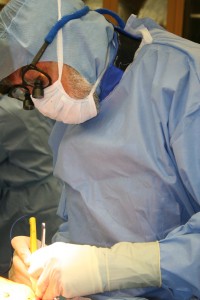
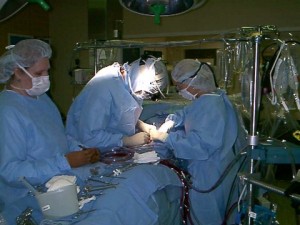
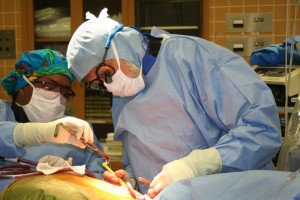
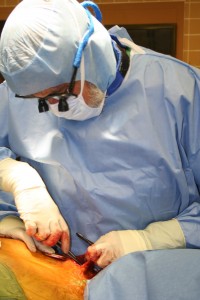
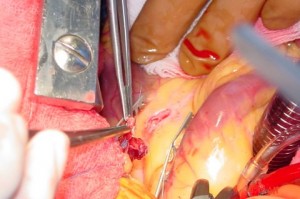
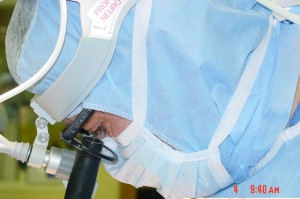
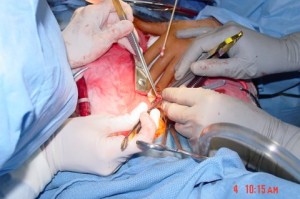
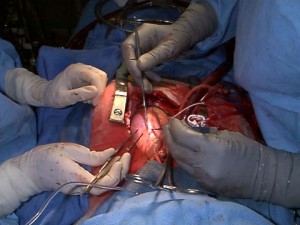
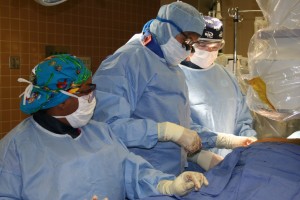
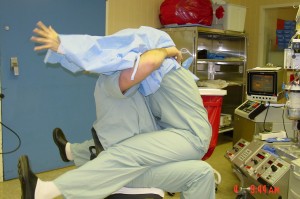
Powerful poem.A Dr. with a big heart.